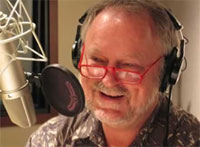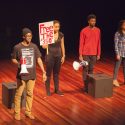Schoenfield composition highlights second Pro Arte Quartet concert
Google the word “freilach” and you will find that it means “happy” or “joyful,” especially in relationship to music.

Schoenfield
American composer Paul Schoenfield says the Yiddish word also describes his recently composed “Three Rhapsodies for Piano Quintet,” commissioned by the UW Pro Arte Quartet as part of its 100-year anniversary celebration currently underway.
Schoenfield’s composition will receive its world premiere performance Saturday, Nov. 19, at Mills Concert Hall in the Mosse Humanities Building on the UW–Madison campus. The 8 p.m. concert is free and open to the public.
It will be preceded by a free 3 p.m. lecture in Grainger Hall of the UW Business School: “The Artist as Distant Early Warning System,” by Bill McGlaughlin, host of the popular “Exploring Music” program that airs on National Public Radio. Events also include a 5 p.m. dinner at the University Club (fee required), and a free 7 p.m. concert preview featuring both the composer and the lecturer.
This second of this centennial season’s four concerts also includes Shostakovich’s “Quartet No. 4 in D Major, Op. 83,” from 1949 and Beethoven’s “String Quartet No. 14 in C-sharp minor, Op. 131,” from 1826, a quartet that many considered to be his finest. Schoenfield’s piece will add a modern, contrasting component to the evening.

McGlaughlin
“Every time I sit down to compose a piece of music, a little voice in my head asks ‘When are you going to get a real job?’” says Schoenfield, a Detroit native and professor of music composition at the University of Michigan in Ann Arbor. “So that became the first movement of my work.”
The composition’s first rhapsody, as Schoenfield calls the movements, is based on the 1957 Silhouettes doo-wop hit “Get a Job.”
The second rhapsody takes both its title and tone from “The Bench of Desolation,” an elliptical Henry James story about unrequited love, a threatened breach-of-promise suit, and a surprise resolution. The third rhapsody, “Klezmorim,” is “joyfully” composed and performed in the Hasidic fashion, the composer says.
“The finale should have the audience on the edge of its seats,” says Sally Chisholm, violist with the Pro Arte who has performed with the composer. “Paul Schoenfield is a favorite among Madison musicians and always delivers unexpected moments of brilliance, wit and intellect.”
Despite his former career as a concert pianist, Schoenfield will not perform the world premiere. Brian Hsu, a University of Michigan doctoral student in piano studies, will perform the work with the quartet.
The Quatuor Pro Arte of Brussels, first formed in 1911-1912, was performing at the Wisconsin Union Theatre on the UW campus on May 10, 1940, when Belgium was overrun and occupied by Nazi forces, turning three of its original four musicians into war orphans. By October of that year, the group had officially become the UW Pro Arte Quartet, making it the school’s first artist ensemble-in-residence.
In addition to Chisholm, current musicians in the Pro Arte, believed to be the world’s oldest continuously performing string quartet and the first quartet anywhere to enjoy a university ensemble-in-residence status, include violinists Suzanne Beia and David Perry and cellist Parry Karp.
For more information on the centennial celebration and a complete schedule of events, click here.
Tags: arts, events, School of Music

